The content of this newsletter
Introduction
Need to know
WGEI All Members meeting in Manila 27th – 29th May
“Open Data – Build Trust”: EITI Global Conference 2019
Highlights of the AFROSAI-E Annual Extractive Industries Workshop 2019
Making Extractive Industries Audit Reports Publicly Accessible
Lessons learned from building extractive industries audit capacity
Introduction
Welcome to the fifteenth edition of the WGEI newsletter! In this edition of the newsletter, you can read about WGEI All Members meeting in Manila 27th – 29th May, “Open Data – Build Trust”: EITI Global Conference 2019, Highlights of the AFROSAI-E Annual Extractive Industries Workshop 2019, Making Extractive Industries Audit Reports Publicly Accessible, Lessons learned from building Extractive Industries Audit Capacity: the Office of the Auditor General of Uganda – A good practice note.
Have a nice read!
Need to know
WGEI All members meeting in Manila, 27th – 29th May (By Stefanie Grace G. Fernandez – Norwegian Audit Office)
It has been three years since the last WGEI All Members meeting was held in Mombasa, Kenya in August 2016. This year’s big event was the 4th WGEI All Members meeting which was successfully hosted by the Commission on Audit of the Philippines from 27-29th May in Manila. A number of activities have been implemented during the last three years. The meeting was therefore an opportunity to report to WGEI members, the INTOSAI community and external stakeholders on the progress of WGEI activities. Likewise, it offered a space for SAI members and external stakeholders to exchange knowledge and experience based on their latest work in the field of extractive industries.
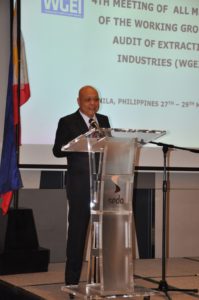
Since its inception, WGEI held annual members’ meetings until 2016. In 2017 the Steering Committee resolved that the All Members meeting should be organized every third year while the Steering Committee working meeting should be held annually. The 4th WGEI All Members meeting was attended by the WGEI SAI members, observers, INTOSAI bodies and regional secretariats as well as external stakeholders in the extractive industries. Some of the external stakeholders who took part in the meeting were representatives from Oxfam, Natural Resource Governance Institute (NRGI), The World Bank, Extractive Industries Transparency Initiative (EITI) and the Mines and Geoscience Bureau of the Philippines.
The highlights of the meeting include the progress reports on each of the main activities of the WGEI Activity Plan 2017-2019 and the proposed WGEI Activity Plan for 2020-2022. The WGEI Secretariat presented the proposed Activity Plan and gathered inputs from its members. Two panel discussions were held to discuss beneficial ownership as well as how SAIs can work with external stakeholders to combat illicit financial flows. Furthermore, the INTOSAI regional secretariats delivered presentations on their latest activities in extractive industries in their respective regions.
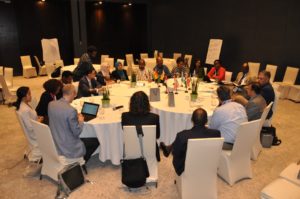
At the end of the last day of the meeting, the ten members of the WGEI Steering committee gathered to summarize the outcomes and resolutions based on the discussions and inputs from the WGEI members. The Steering Committee also discussed potential sources of funding for the implementation of WGEI activities, the WGEI Chairmanship from 2023 and specific action plans based on the meeting resolutions.
Meeting presentations and progress reports for each activity can be accessed here.
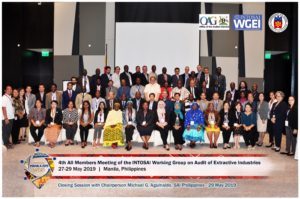
Looking back at each All Members’ meeting since 2014, we observe a growing number of SAIs joining the Working Group as well as an increasing number of external stakeholders being engaged in WGEI activities. During the 4th All Members meeting, we also witnessed how SAI members were active in discussions and enthusiastic about participating in WGEI activities. All these developments are a positive step towards achieving WGEI’s goal of creating an arena for knowledge and experience sharing and promoting the audit of extractive industries, and thereby contributing to good governance, accountability and transparency.
“Open Data – Build Trust”: EITI Global Conference 2019 (By Stefanie Grace G. Fernandez – Norwegian Audit Office and Annicken Tvenge – Norwegian Audit Office/Audit Service Sierra Leone)
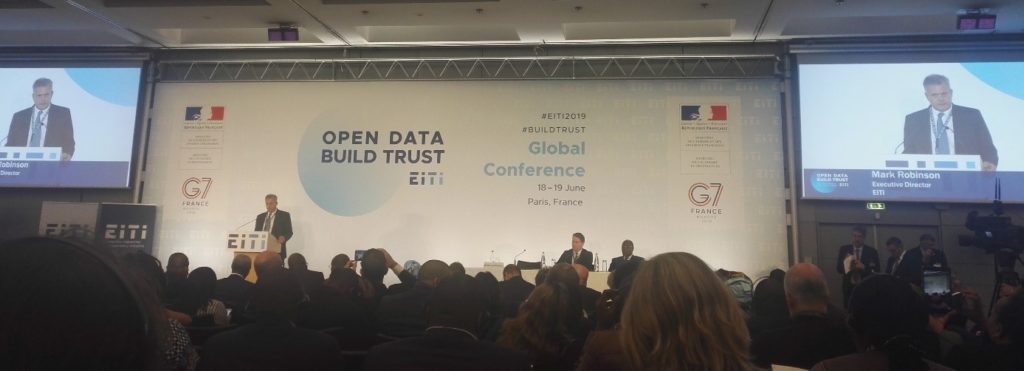
Every three years the Extractive Industries Transparency Initiative (EITI) organises a Global Conference. The topic of this year’s event, which took place in Paris in June, was “Open Data – Build Trust”. More than 1000 stakeholders representing government, multinational corporations, international organisations and civil society, discussed transparency, accountability and governance of the extractive industries sector. Representatives from the Supreme Audit Institutions (SAI) of Iraq, Mozambique, Norway, Uganda and Sierra Leone were among those present.
EITI
EITI is an international organisation that works to promote transparency and good governance in the oil, gas and minerals sector, also called extractive industries (EI). EITI promotes better understanding of the sector and encourages public debate. As of today there are 52 countries implementing the EITI Standard, a global standard for the good governance of extractive industries. The standard requires the disclosure of information from every step of the EI value chain, from awarding the resource extraction rights to how revenues benefit the public. For each implementing country, a multi-stakeholder group (MSG) is established with representatives from the government, EI companies and civil society.
Below is an illustration depicting how the EITI works with transparency in three main steps:

Source: EITI Progress Report 2018
During the Global Conference, 2019 EITI standard was launched. The new standard focuses more on systematic disclosure of extractives data as a default rather than EITI reports. The standard mandates all implementing countries to publish contracts and licenses signed from 2021. It also contains new requirements on environmental reporting (should cover material environmental payments by companies to governments, and encourage disclosures of contextual information related to environmental monitoring) and gender (requires MSGs to consider gender balance in their representation and disclose employment data by company, gender and occupational level).
Transparency builds trust
The theme “Open Data, Build Trust” was chosen to embody three elements: Open data as the norm, building trust as the bedrock, and demonstrating relevance for the global agenda. Transparency was the topic throughout all sessions under the conference (see conference page for full programme). Some of the issues covered in the sessions were:
- Transparency on costs and cost auditing in the petroleum sector
- Civil society’s role in promoting transparency, accountability and sustainability in the governance of natural resources
- Quantifying the economic, environmental and social costs and benefits of extraction and why it is important to publish this information
- How transparency about ownership can strengthen anti-corruption work
- Why open contracts and agreements are important, and the benefits of such disclosure
- How EITI contributes to the implementation of the Sustainable Development Goals
- How data and economic models can be analysed and used in order to find suitable fiscal regime in extractive industries
- How open data can enhance state-owned enterprise performance and benchmarking
- Transparency related to the social, environmental and local impacts of extractives
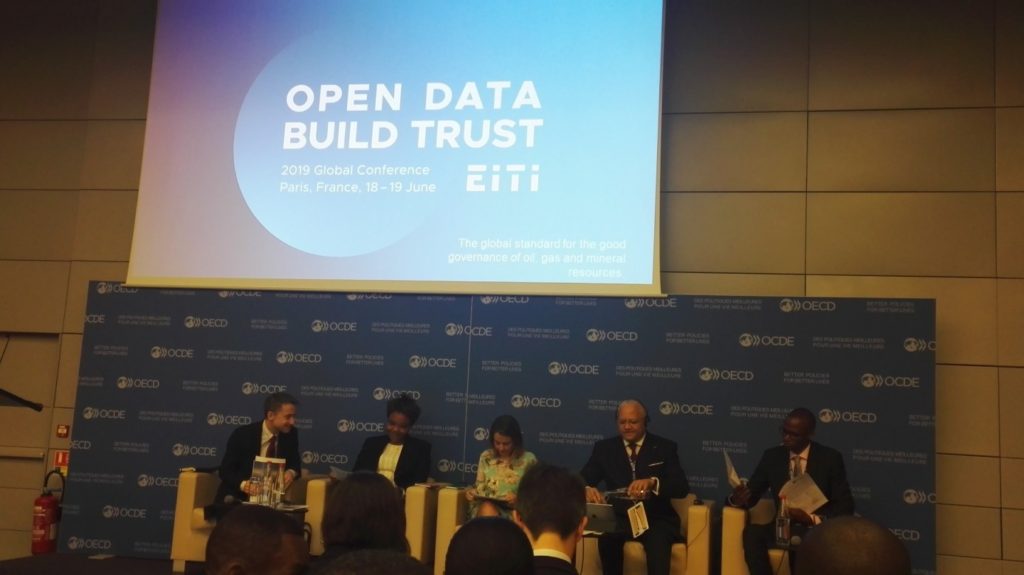
The role of Supreme Audit Institutions in the EI sector was highlighted in some of the sessions, such as the panel discussion on «Cost auditing in the petroleum sector: A missing item on the transparency agenda?». EITI’s work includes the disclosure of contracts and agreements, the amount paid by the companies to the government in taxes and the amount the government has received in tax revenue. Some of the questions raised were whether there is also a need to disclose the information on companies’ costs and the government’s audit of these, what would be the role of SAIs in this regard and how cost audit reports can be used more actively. A study by Oxfam shows that there are a number of challenges with such cost audits. However, Oxfam also suggests potential measures that government, civil society, international development organisations and EI companies can take to handle these challenges.
During another session, on “Leveraging information technology in EITI mainstreaming”, assuring the quality of the data in the license and contract databases and cadastre systems that many public entities are now developing, was mentioned as an important role of the SAIs. Some even suggested that when systems improve, and publication of data is automated, validation of data will no longer be needed, as validation moves into the SAIs. SAIs are getting stronger, and some participants predicted that there will be a time when EITI is no longer needed in parallel with the SAIs’ work.
In addition to the executive sessions, a parallel session called the “Pitch Corner” was held, where organisations and local EITI offices from different countries delivered a short presentation on trends, developments and work done in the EI sector in their respective countries.
Government and industry leaders announced their commitment to transparency and good governance
At the end of the conference, around 30 leaders from EI companies, government ministers and other public sector entities from different countries pledged to contribute to more transparency and good governance of the EI sector. The governments of Denmark and France will continue to support EITI financially. The multinational petroleum company Total promised to lead by example with progressive corporate transparency policies. The governments of Guyana and Tanzania committed to publishing contracts from the oil, gas and mineral sector. And Ecuador, Equatorial Guinea and Zimbabwe are considering making an application to join EITI.
Relevance of the EITI to the SAI
So why should SAIs care about what happens in EITI and the developments in the EITI standard? The EITI process and reporting provides the following benefits to SAI auditors:
- Easy access to information: The EITI process provides alternative ways of accessing documents from companies, through the national EITI secretariat.
- Identify discrepancies and recommendations that can be used by the EI auditors for planning
(risk assessment). - Encourages companies to disclose their beneficial ownership (direct or indirect ownership or control), which is very useful in assessing transfer pricing issues.
- Enhances openness in reporting. Implementing countries are expected to produce EITI Reports on an annual basis.
In many EITI implementing countries, the multi-stakeholder group sends reporting (disclosure) templates from the government entities to the SAIs for certification while the EI companies’ disclosures are sent to their private auditors for certification, before reconciliation of the government receipts and the companies’ payments. The role of the SAI is therefore crucial in the EITI reconciliation process.
For WGEI and for SAIs, the EITI Global Conference was an excellent opportunity to learn more about different perspectives, current challenges and progress in the EI sector, and the work of other organisations, many of which organised informative side events. It was also a good opportunity to get to know EI stakeholders such as Natural Resource Governance Institute (NRGI) and Responsible Mining Index Foundation and discuss areas for possible synergies and collaboration between them and SAIs. NRGI was represented in many of the sessions and panels, and had published several relevant articles. These are available on NRGI’s EITI conference page. NRGI and EITI are some of the external stakeholders WGEI has been reaching out to and cooperating with, as we aim to reach our common goal in promoting transparency, accountability and good governance in the EI sector.
After the conference, EITI has reached out to INTOSAI about possible future workshops between SAIs and EITI.
Highlights of the AFROSAI-E Annual Extractive Industries Workshop 2019 (By Allan. K. Amanya – OAG-Uganda)
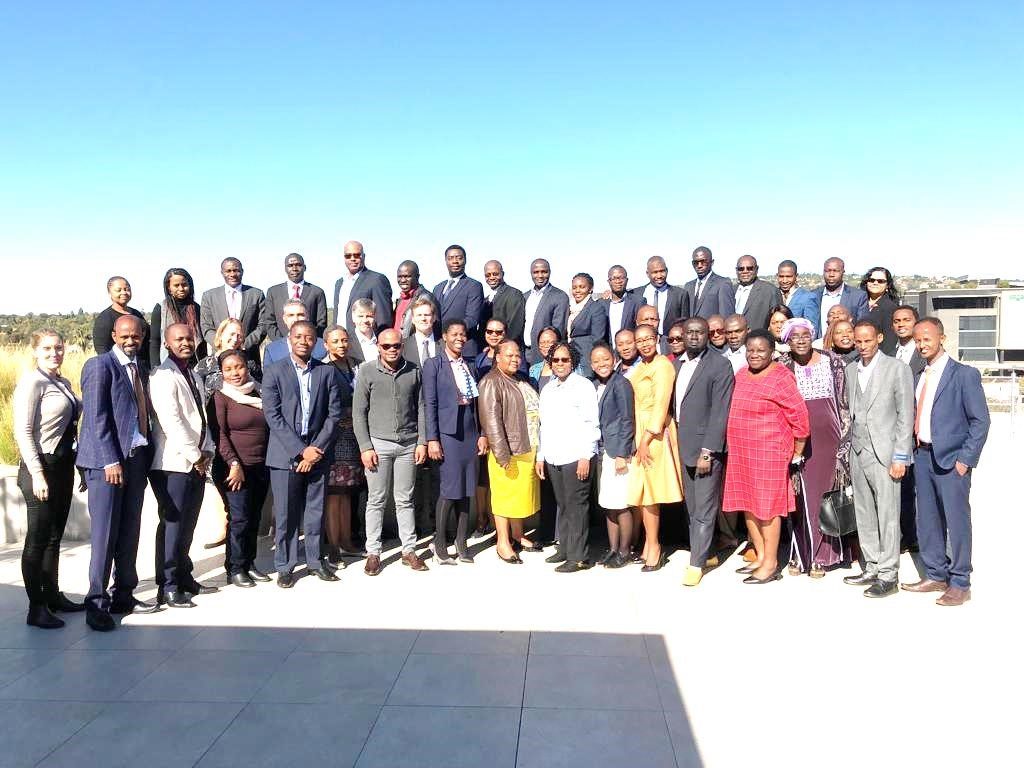
The audit of extractive industries continues to gain momentum both at the national level where SAI’s are involved in the audit of public funds and on the international agenda where transparency in the exploitation of natural resources is a key focus. Most African governments have realized the potential the extractive industry can have on their economies and social transformation of its citizenry if well managed and as a result SAI’s are in the spotlight more than ever before as citizens, civil society and other stakeholders intensify their demand for accountability for the exploitation of natural resources. To keep abreast with the emerging risks within the industry, AFROSAI-E developed and circulated an exposure draft on audit considerations for the EI sector and subsequently launched an e-learning course on the audit of extractives for public sector auditors. Following the circulation of the exposure draft, a workshop organized by AFROSAI-E was held from 3-7 June 2019 in Pretoria, South Africa to get feedback from the SAI participants on the exposure draft and the latest industry developments.
The workshop was well attended by participants from over 14 SAIs. The discussions featured a host of topical issues in extractives among which included transfer pricing, risk assessment along the EI value chain, fiscal regimes and many others. Throughout the discussions and experience sharing by participants, it came out clearly that the challenges faced by the participating SAIs were not unique in nature; from inadequate capacity of the staff involved in the audit of extractives, mandate limitation of most SAI’s on the extent to which they can carry out the audit given that most of the companies involved in the exploitation of these natural resources are privately owned and the contracts with the governments do not provide for the audit of their operations through a direct engagement . This issue was singled out by most SAI’s as the biggest challenge in executing their mandate. Opacity in contract negotiations and the high level of secrecy that characterizes the extractives sector most especially regarding the contracts and limited information sharing amongst the government ministries, departments and agencies involved in the sector was also seen as a challenge despite most SAI’s having constitutional powers to access information.
The challenge of information and knowledge asymmetry between SAI staff and companies involved in exploitation of the resources cannot be underestimated given that the companies usually have better knowledge due to their international foot print and diversely skilled workforce. The participants concluded therefore that SAIs need to have a dedicated EI sector audit unit to build capacity and ensure a comparable level of expertise. To illustrate this point, SAI Uganda made a presentation on the key enablers for its successful EI establishment among which included; Top management support/buy-in, staff skilling and competencies, staff training and retention, creation of in-house knowledge sharing platforms like the energy taskforce, a platform that encourages idea sharing involving top management.
The workshop concluded with the participating SAIs drawing up action plans (“Pretoria 2019 Declaration” ) highlighting the key action points and the implementation timelines which will form a basis for assessing the SAIs performance in the next AFROSAI-E workshop.
Making Extractive Industries Audit Reports Publicly Accessible (By Gilbert Makore – OXFAM International)
Supreme Audit Institutions as Custodians of Finite Extractive Resources
Mining, oil and gas resources have the potential to significantly contribute to countries’ socio-economic development. Socio-economic benefits stream in through taxes, a share of the revenues and economic linkages. The realisation of this potential- to contribute to socio-economic development- is not certain. Huge expectations for socio-economic transformation can be unmet due to poor governance of the sector characterised by negotiating poor terms with companies, failure to effectively monitor company operations, poor use of revenues that accrue from the sector and limited public participation in decision making processes. It is against this background that the role of Supreme Audit Institutions (SAIs) can be viewed. SAIs are custodians of public funds and are constitutionally mandated with ensuring that public funds are judiciously used. Public funds enable investments in social service delivery and without their precocious use, economic and social progress is all but impossible. Where a significant portion of public funds is derived from resources such as oil, gas and minerals, the role of SAIs in auditing the extractive sector becomes even more imperative.
The role of SAIs vis-à-vis the extractive sector is important due to a number of factors. Firstly, extractive resources are wasting assets which are non-renewable. There is therefore, often one opportunity to ‘get things right’.
Secondly, extractive resources are also prone to boom and bust price cycles. This commodity price volatility means windfall revenues are not in perpetuity and must be secured as price downturns are all but guaranteed. Lastly, the discovery and exploitation of extractive resources also often brings with it huge public expectations of windfall benefits, material benefits and economic transformation. Where these expectations are not matched through revenues and the delivery of public goods- there is a likelihood of conflict. The role of SAIs with respect to extractive industry audits and the interface between SAIs and the public on extractives is critical.
SAIs often enjoy significant independence in how they operate and in many countries- are accountable directly to Parliament, that is, essentially the general citizenry. Extractive Industries (EI) audit findings must be known to the public as extractive resources are juridically owned by the public and often only held in trust, by the government. Additionally, where EI audit reports are made, they must make sense to the public, as the office is directly accountable to the public, through Parliament.
Citizens Are Often Unaware of the Role of SAIs and their Performance
However, what often happens is that there is a chasm between the publication or public disclosure of EI audit reports or findings- and the public’s knowledge, familiarity and engagement with the audit findings. The effectiveness of SAIs is not just in providing information that ensures that leakages of public funds are plugged and that there is some remedial action. The effectiveness also lies in the extent to which SAIs facilitate the public’s access to information, access to public participation and access to justice- in the discharge of its mandate.
A report is only useful to the extent that it is owned, understood and used by the public. While SAIs are often seized with complex and technical audit undertakings, a major audience for audit findings should be the public. SAIs should ordinarily provide information for different interlocutors, including the public, to meaningfully participate and influence the governance of the sector.
There is often significant media attention when SAIs launch audit reports. However, this media attention often only lasts a few weeks. The disclosure of audit findings is often at the tail end of a long audit process. In some country contexts, citizens, particularly those in far flung communities do not even know of the existence and role of SAIs.
With respect to extractive industries, civil society and local communities have been clamouring for improved transparency and accountability. EI audit reports, be they petroleum cost audits or value for money audits (special audits) are an important element in the EI transparency and accountability toolkit. The information disclosed by SAIs and the credibility of the office itself are often unquestioned as this is a governance institution that is constitutionally established. Information and data disclosed by SAIs is, in the eyes of government institutions, more credible than that disclosed by civil society organisations.
In countries like Zimbabwe, where international transparency initiatives such as the Extractive Industries Transparency Initiative (EITI) are absent or moribund, it is often EI audit reports that offer a solitary window into the challenges bedevilling the EI sector in a country. Conversely, where international standards are adopted and implemented, such as in Uganda and Tanzania, respectively, reports from the office of the auditor general provide useful additional data and information. In Uganda, the audit of the Petroleum Fund is an example, while in Tanzania, the Controller and Auditor General (CAG) audits into the mining sector have gone onto establish the likelihood of illicit financial flows in the sector. The availability and accessibility of this information is the bedrock of citizen participation.
How to improve access to information related to EI audit reports
To close the gap between the information disclosed and the information that is accessed by the public, SAIs will need to significantly invest in communication and making reports more accessible. Currently most audit reports are voluminous and dense; and not necessarily sector specific. They are often as inaccessible to civil society organisations as they are to local communities.
While actors such as civil society, the media and parliament- have a role in distilling and analysing audit findings for the benefit of the public, SAIs equally have a role in ensuring that reports are accessible. There is already some work that is on-going to address this- the International Organisation of Supreme Audit Institutions (INTOSAI) Working Group on Extractive Industries (WGEI) is increasingly engaging with civil society organisations.
Some of the strategies that can be used by SAIs and funding or strategic partners to improve access to information related to EI audit reports and bridge the gap between public disclosure and information use are detailed below;
- SAIs should explore directly engaging civil society organisations and the media to share audit findings. With respect to EI findings, SAIs should specifically engage with organisations that are working on extractive issues. An example could be directly sharing audit findings with EITI multi-stakeholder groups and or national civil society coalitions working on extractives.
- SAIs should consider sharing audit findings with relevant parliamentary committees. In most countries, these are committees responsible for providing oversight on the extractive sector and public accounts.
- SAIs should consider making considerable investments in improving communication through simplifying EI audit findings and reports. This may include making simplified summaries with visualisations that communities and civil society organisations can easily comprehend.
- SAIs should endeavour to make themselves more accessible to the public. This may mean creating sub-national offices at provincial or district levels. SAI Uganda is an exemplar in this regard as it has 11 provincial offices across the country. Where resources are limited and this is not possible, SAIs should make periodic outreach visits to district or subnational levels.
- SAIs should consider undertaking evaluations on the use of EI audit reports and these evaluations should inform future approaches to VfM audits and public disclosure of the same.
- Publicise the role of SAIs and how citizens can engage with their offices.
Access to information is the basis for citizen participation and access to justice in the extractive sector. SAIs often produce credible reports that should ordinarily support CSO, parliamentary and citizen engagement in the governance of the extractive sector. These good reports are often inadequately used. There is a need for SAIs to reimagine how they package and present audit findings and how they can make their offices more accessible to local citizens.
Lessons learned from building extractive industries audit capacity
The Office of the Auditor General of Uganda – A Good practice Note
There is a strong call within the INTOSAI community for more systematic compilation of the many experiences, tools and lessons learned by different SAIs and partners in auditing within the field of Extractive Industries (EI). Against this backdrop, the Offices of the Auditor General of Uganda (OAGU) and Norway (OAGN) decided to document OAGU’s experiences in building up audit capacity in this field from a “lessons learned” perspective.
At the WGEI Meeting in Manila in May 2019 and at the AFROSAI-E EI workshop in June, lessons were presented.
The lessons will also be published on the WGEI website soon, along with a good practice note that goes into more detail about the various lessons and provide examples of the results of the lessons. Stay tuned for more information on the website.





